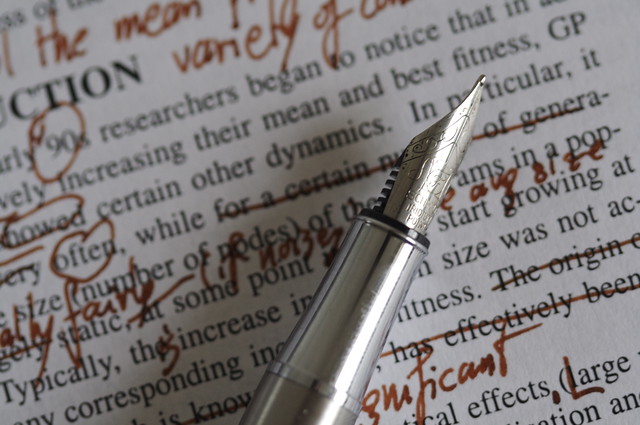- What is peer editing?
- Why providing meaningful feedback is important
- Why it can help me and the person whose work I am critiquing
- What I learned most from the slideshow and my interpretation
- What I learned from the Top 10 Mistakes video

Source: Photo found on This site on how to edit a sermon
From the What is Peer Editing? video, I learned that peer editing means "working with someone your own age to help improve, revise, and edit his or her writing." I think the most important thing to keep in mind while editing a peer's work is that you are doing this to improve their work. The criticism given should only serve to improve their work now and in the future.
Providing meaningful feedback to your peers is important because it is making their work better and it teaches you what mistakes to look for in your own work. I learn better if I am teaching someone. For example, if I had to learn about the muscles of the human body, I would retain much more information by telling someone else and explaining it to them than just by reading it on a note card. The same goes with critiquing someone else's blog post or project. By critiquing their work in a meaningful way, I am simultaneously making notes of what to look for in my own projects and making sure I do not make the same mistakes.
In the slideshow, Peer Edit With Perfection Tutorial, I loved the three simple steps they gave to effectively peer edit. Their steps were to:
1. Compliment
2. Suggestions
3. Corrections
Complimenting someones work is a great way to start off peer editing because people are more likely to listen to what you have to say if you start off by praising what you like about their work. Step 2 is to offer any suggestions. This could be anything that you think could be done to the blog post or project that could improve it such as making sure that everything is organized so everything flows or making sure there are plenty of details and that they stay on topic. The final step is to help show them any corrections that need to be made. These are minor mistakes like spelling, grammar, punctuation, or sentence structure. All of these steps should be completed in the most positive and helpful way. The main point is to help them improve and not to make them feel bad about their work.
In this short video, Peer Review Top 10 Mistakes, the scene that had the biggest impact on me was where one of the children acted like Defensive Dave. This scene shows how NOT to act when your own work is being critiqued. The important thing to learn from this video is that peer reviewing can be difficult but to know that the peer edits are meant to help and hurt you. You should not take the critiques personally and to keep in mind that someone you are critiquing may think that way and to adjust you approach to make sure they feel comfortable and not feel like you are putting them or their work down.
Very good, detailed post! Loved the links and picture. Be sure and add in your picture source using the ALT and title modifier codes :)
ReplyDeleteTori,
ReplyDeleteI learned a lot from your post on peer editing. Peer editing can be a very touchy subject. I agree with you on your approach to peer editing by making them feel comfortable. Although I am sure this can get some what complicated for younger students to learn that others are not putting their work down.